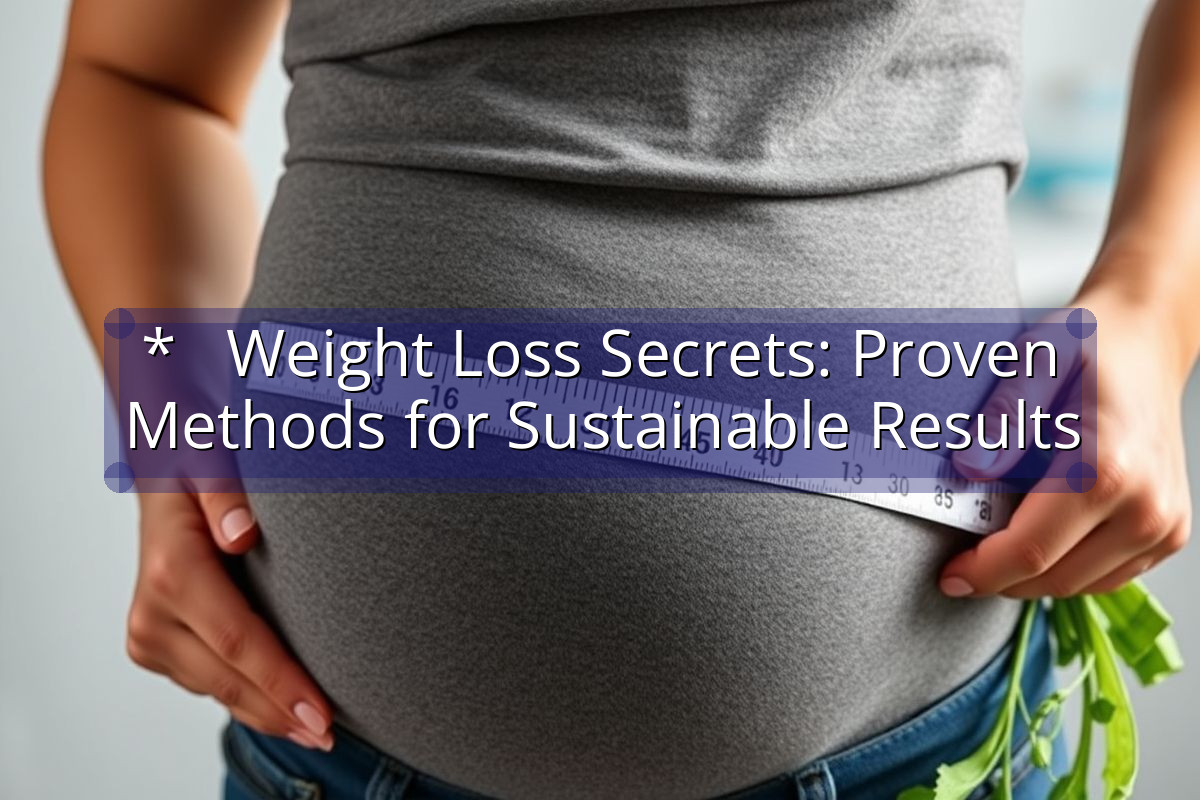

Weight Loss Secrets: Proven Methods for Sustainable Results
Embarking on a weight loss journey can feel like navigating a complex maze filled with misleading information and short-lived solutions. The allure of quick fixes and fad diets often overshadows the fundamental principles of sustainable and healthy weight loss. This article aims to cut through the noise, providing you with evidence-based strategies and actionable tips to achieve lasting results. Forget about the restrictive diets that promise overnight transformations; instead, let’s focus on building healthy habits that will support your well-being for years to come. Our approach emphasizes gradual lifestyle changes, mindful eating, and a balanced approach to exercise, empowering you to take control of your health and reach your weight loss goals effectively.
The journey to a healthier weight is not just about shedding pounds; it’s about transforming your relationship with food, understanding your body’s needs, and cultivating a positive mindset. It requires patience, consistency, and a willingness to adapt your approach as you learn more about what works best for you. This comprehensive guide will walk you through the essential components of a successful weight loss plan, from setting realistic goals to creating a personalized nutrition strategy and incorporating regular physical activity into your daily routine. Prepare to discover the secrets to sustainable weight loss and unlock your potential for a healthier, happier you.
Understanding the Fundamentals of Weight Loss
The Calorie Balance Equation
The cornerstone of weight loss lies in understanding the calorie balance equation: calories in versus calories out. To lose weight, you need to create a calorie deficit, meaning you burn more calories than you consume. This can be achieved through a combination of reducing calorie intake and increasing physical activity. However, it’s crucial to approach this deficit in a healthy and sustainable manner. Drastically cutting calories can lead to nutrient deficiencies, muscle loss, and a slowed metabolism, ultimately hindering your long-term weight loss efforts. Instead, aim for a moderate calorie deficit of around 500-750 calories per day, which can typically result in a safe and effective weight loss of 1-2 pounds per week. Tracking your calorie intake using a food diary or a mobile app can be incredibly helpful in understanding your eating habits and making informed choices.
While the calorie balance equation is fundamental, it’s important to recognize that not all calories are created equal. The quality of the foods you consume plays a significant role in your overall health and weight loss success. Prioritizing whole, unprocessed foods like fruits, vegetables, lean proteins, and whole grains will provide your body with the nutrients it needs to function optimally and keep you feeling full and satisfied. Conversely, processed foods, sugary drinks, and excessive amounts of unhealthy fats can contribute to weight gain and negatively impact your health. Focus on making smart food choices that nourish your body and support your weight loss goals.
Furthermore, understanding your Basal Metabolic Rate (BMR) can provide valuable insights into your daily calorie needs. BMR is the number of calories your body burns at rest to maintain basic bodily functions. Several online calculators can estimate your BMR based on factors such as age, gender, height, and weight. Once you know your BMR, you can adjust your calorie intake and activity level to create the desired calorie deficit for weight loss. Remember to consult with a healthcare professional or a registered dietitian for personalized guidance and to ensure you are meeting your nutritional needs.
The Role of Macronutrients
Macronutrients – carbohydrates, proteins, and fats – are the building blocks of our diet and play essential roles in our health and weight loss efforts. Understanding how these macronutrients affect your body can empower you to make informed food choices and optimize your diet for sustainable results. Protein, for example, is crucial for building and repairing tissues, supporting muscle growth, and promoting satiety. Including adequate protein in your diet can help you feel fuller for longer, reducing the likelihood of overeating and supporting your weight loss goals. Aim for a protein intake of around 0.8-1 gram per pound of body weight, depending on your activity level.
Carbohydrates are the body’s primary source of energy, but not all carbohydrates are created equal. Focus on consuming complex carbohydrates like whole grains, fruits, and vegetables, which are rich in fiber and nutrients. These carbohydrates are digested more slowly, providing a steady release of energy and preventing blood sugar spikes. Limit your intake of simple carbohydrates like sugary drinks, processed foods, and refined grains, which can lead to rapid blood sugar fluctuations and contribute to weight gain. Fiber, a type of carbohydrate that the body cannot digest, is particularly beneficial for weight loss. It adds bulk to your diet, promoting feelings of fullness and aiding in digestion.
Fats are often demonized in the context of weight loss, but they are essential for hormone production, nutrient absorption, and overall health. The key is to choose healthy fats like monounsaturated and polyunsaturated fats, found in foods like avocados, nuts, seeds, and olive oil. These fats can help reduce inflammation, improve heart health, and support brain function. Limit your intake of saturated and trans fats, which are found in processed foods, red meat, and full-fat dairy products. A balanced diet that includes all three macronutrients in appropriate proportions is crucial for sustainable weight loss and overall well-being.
Implementing Sustainable Lifestyle Changes
Building Healthy Eating Habits
Sustainable weight loss is not about following restrictive diets; it’s about building healthy eating habits that you can maintain for the long term. This involves making gradual changes to your diet and lifestyle, focusing on mindful eating, and creating a positive relationship with food. One of the most effective strategies for building healthy eating habits is to plan your meals in advance. This can help you make healthier choices, avoid impulsive eating, and ensure you are getting the nutrients you need. Take some time each week to plan your meals, create a shopping list, and prepare some ingredients in advance. This will make it easier to stick to your healthy eating plan, even when you are busy or stressed.
Mindful eating is another crucial component of sustainable weight loss. It involves paying attention to your hunger and fullness cues, savoring each bite, and eating without distractions. This can help you become more aware of your eating habits, prevent overeating, and develop a healthier relationship with food. Practice eating slowly, putting your fork down between bites, and focusing on the taste and texture of your food. Avoid eating in front of the TV or computer, as this can lead to mindless eating and overconsumption. By practicing mindful eating, you can learn to enjoy your food more and make more conscious choices about what you eat.
Finally, it’s important to create a supportive environment that promotes healthy eating. This may involve cleaning out your pantry and refrigerator of unhealthy foods, stocking up on healthy snacks, and surrounding yourself with people who support your weight loss goals. Don’t be afraid to ask for help from friends, family, or a registered dietitian. Having a support system can make a significant difference in your ability to stick to your healthy eating plan and achieve sustainable weight loss.
Incorporating Regular Physical Activity
Physical activity is an essential component of any successful weight loss plan. Not only does it help you burn calories, but it also improves your cardiovascular health, strengthens your muscles and bones, and boosts your mood. The key is to find activities that you enjoy and can incorporate into your daily routine. This could include walking, running, swimming, cycling, dancing, or any other form of exercise that gets your heart rate up. Aim for at least 150 minutes of moderate-intensity aerobic exercise or 75 minutes of vigorous-intensity aerobic exercise per week, as recommended by the American Heart Association.
In addition to aerobic exercise, it’s also important to incorporate strength training into your routine. Strength training helps build muscle mass, which can boost your metabolism and make it easier to lose weight. It also improves your strength, balance, and overall physical function. Aim for at least two strength training sessions per week, focusing on all major muscle groups. You can use weights, resistance bands, or your own body weight to perform strength training exercises.
If you’re new to exercise, start slowly and gradually increase the intensity and duration of your workouts. Don’t be afraid to try different activities until you find something you enjoy. Make exercise a regular part of your daily routine by scheduling it into your calendar and treating it as an important appointment. Find a workout buddy to help you stay motivated and accountable. Remember, even small amounts of physical activity can make a big difference in your health and weight loss efforts.
Tracking Progress and Staying Motivated
Setting Realistic Goals and Monitoring Results
Setting realistic goals is crucial for staying motivated and achieving sustainable weight loss. Avoid setting unrealistic expectations or trying to lose weight too quickly. A healthy and sustainable rate of weight loss is around 1-2 pounds per week. Break down your long-term weight loss goals into smaller, more manageable steps. For example, instead of aiming to lose 50 pounds, set a goal to lose 5 pounds in the first month. This will make the process feel less daunting and more achievable.
Regularly monitor your progress by tracking your weight, body measurements, and other relevant metrics. This will help you stay accountable and see how far you’ve come. Use a food diary or a mobile app to track your calorie intake and exercise. Consider taking progress photos to visually document your transformation. Don’t get discouraged if you experience plateaus or setbacks. Weight loss is not always linear, and there will be times when you don’t see the results you expect. The key is to stay consistent with your healthy habits and adjust your approach as needed.
Celebrate your successes along the way, no matter how small. Reward yourself for reaching your milestones with non-food related treats, such as a new workout outfit, a massage, or a fun activity. Focus on the positive changes you’re making to your health and well-being, rather than just the number on the scale. Remember, weight loss is a journey, not a destination. Embrace the process and enjoy the benefits of a healthier, happier you.
Overcoming Challenges and Maintaining Consistency
The journey to sustainable weight loss is rarely smooth sailing. You’re likely to encounter challenges and setbacks along the way, such as cravings, social events, and emotional eating. The key is to develop strategies for overcoming these challenges and maintaining consistency with your healthy habits. One of the most common challenges is dealing with cravings. When a craving strikes, try to identify the underlying cause. Are you truly hungry, or are you eating out of boredom, stress, or emotional need? If you’re not truly hungry, try distracting yourself with a different activity, such as going for a walk, reading a book, or calling a friend.
Social events can also be challenging, especially when there are lots of tempting foods and drinks available. Plan ahead by reviewing the menu in advance and making healthy choices when possible. Don’t be afraid to politely decline unhealthy offerings or bring your own healthy dish to share. Practice mindful eating at social events, savoring each bite and avoiding overeating. Emotional eating is another common challenge. If you find yourself turning to food for comfort, try to identify the underlying emotions and find healthier ways to cope, such as exercise, meditation, or talking to a therapist.
Maintaining consistency with your healthy habits is essential for long-term weight loss success. Don’t give up if you have a bad day or a week. Just get back on track as soon as possible and focus on making small, sustainable changes to your lifestyle. Remember, it’s not about being perfect; it’s about making progress. Surround yourself with a supportive community of friends, family, or online groups who can offer encouragement and accountability. Seek professional help from a registered dietitian or a certified personal trainer if you need additional guidance or support. With patience, persistence, and a positive mindset, you can overcome any challenges and achieve your weight loss goals.
Sample Meal Plan Table
| Meal | Example Foods | Approximate Calories |
|---|---|---|
| Breakfast | Oatmeal with berries and nuts | 350 |
| Lunch | Grilled chicken salad with mixed greens and vinaigrette dressing | 450 |
| Dinner | Baked salmon with roasted vegetables | 550 |
| Snacks | Apple slices with almond butter, Greek yogurt with fruit | 200 each |
List of Healthy Snack Options
- Almonds
- Greek yogurt
- Apple slices with peanut butter
- Hard-boiled eggs
- Vegetable sticks with hummus
Sıkça Sorulan Sorular
Conclusion
Embarking on a weight loss journey is a deeply personal and transformative experience. It requires commitment, perseverance, and a willingness to embrace sustainable lifestyle changes. By understanding the fundamentals of calorie balance and macronutrients, building healthy eating habits, incorporating regular physical activity, and staying motivated, you can achieve your weight loss goals and maintain a healthy weight for life. Remember that there is no quick fix or magic bullet. The key is to focus on making gradual, sustainable changes that you can incorporate into your daily routine. Be patient with yourself, celebrate your successes, and don’t be afraid to ask for help when you need it. With the right approach and a positive mindset, you can unlock your potential for a healthier, happier you.
“`
